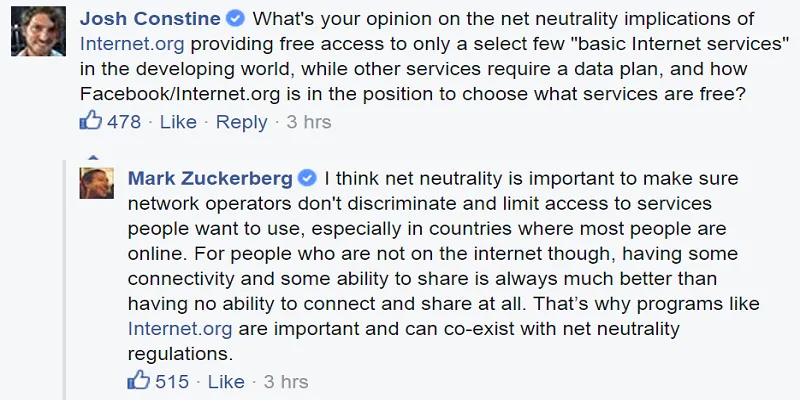Mark Zuckerberg's take on net neutrality: Facebook != The Internet
The debate around Net Neutrality has been going around like wildfire. In India, the uproar kicked off when Flipkart started talking with Airtel about Airtel Zero (splitting India’s Internet into many Internets). The debate took a u-turn when Flipkart backed out of the deal and stood by net neutrality. They released a statement saying, "We at Flipkart have always strongly believed in the concept of net neutrality, for we exist because of the Internet."
Alongside, Sachin Bansal, co-founder of Flipkart openly spoke about other giants like Facebook that have been violating net neutrality in India with initiatives like Internet.org. Cleartrip, one of the partners for Internet.org backed out of it today. In this light, Facebook founder Mark Zuckerberg opened himself up for an hour to an open Q&A and of course the topic of Internet.org came along. Josh Constine, a writer at Techcrunch asked Mark about Net Neutrality and Internet.org. Here's what Mark had to say:

This thread was picked up on Reddit and the discussion that has ensued can be followed here. There are two sides to Internet.org:
-> The Internet.org initiative has a motive of spreading awareness about the internet and taking it to more and more people. This seems like a social cause but underneath it, there's a bigger repercussion.
-> As one of the comments on the Reddit thread says, "I read a very interesting study on the penetration of FB in developing countries (Thailand and Indonesia). One of the blinding insights from the research was, many who had access to FB because of such free data packs, did not even know they were on the internet. All they knew was Facebook and not the web. This specifically defeats the purpose of making people aware of the internet." (millions of Facebook users don't know they're using the internet)
Cleartrip's backing out of the Internet.org is also an implication of the same dilemma. The debate rages on and it'll be interesting to see how the rules shape up. Mark is going to conduct more Q&A's on his Facebook page and here are some other takeaways from his first open Q&A.
Follow @pranesh_prakash, @jackerhack and @nixxin to learn more and stay abreast to the topic of net neutrality. Here's a video we made for a better understanding of what it means:
Update:
Post this Q&A, mark wrote a post specifically for India and the concerns regarding net neutrality, here' an excerpt:
The internet is one of the most powerful tools for economic and social progress. It gives people access to jobs, knowledge and opportunities. It gives voice to the voiceless in our society, and it connects people with vital resources for health and education.
I believe everyone in the world deserves access to these opportunities.
In many countries, however, there are big social and economic obstacles to connectivity. The internet isn’t affordable to everyone, and in many places awareness of its value remains low. Women and the poor are most likely to be excluded and further disempowered by lack of connectivity.
This is why we created Internet.org, our effort to connect the whole world. By partnering with mobile operators and governments in different countries, Internet.org offers free access in local languages to basic internet services in areas like jobs, health, education and messaging. Internet.org lowers the cost of accessing the internet and raises the awareness of the internet’s value. It helps include everyone in the world’s opportunities.
We’ve made some great progress, and already more than 800 million people in 9 countries can now access free basic services through Internet.org. In India, we’ve already rolled out free basic services on the Reliance network to millions of people in Tamil Nadu, Maharashtra, Andhra Pradesh, Gujarat, Kerala and Telangana. And we just launched in Indonesia on the Indosat network today.
We’re proud of this progress. But some people have criticized the concept of zero-rating that allows Internet.org to deliver free basic internet services, saying that offering some services for free goes against the spirit of net neutrality. I strongly disagree with this.
We fully support net neutrality. We want to keep the internet open. Net neutrality ensures network operators don’t discriminate by limiting access to services you want to use. It’s an essential part of the open internet, and we are fully committed to it.
But net neutrality is not in conflict with working to get more people connected. These two principles — universal connectivity and net neutrality — can and must coexist.
To give more people access to the internet, it is useful to offer some service for free. If someone can’t afford to pay for connectivity, it is always better to have some access than none at all.
Internet.org doesn’t block or throttle any other services or create fast lanes -- and it never will. We’re open for all mobile operators and we’re not stopping anyone from joining. We want as many internet providers to join so as many people as possible can be connected.
Read the full argument and replies on the Facebook thread.
Disclaimer: Internet.org is an advertiser on YourStory. Facebook and Reliance Communications have partnered to bring Internet.org to India.







